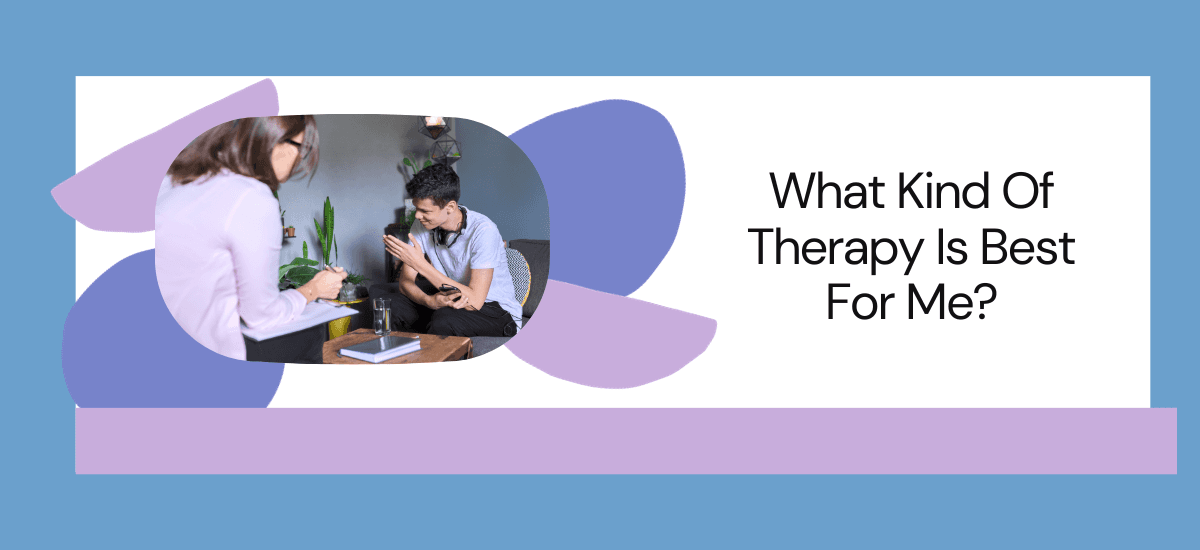What Kind Of Therapy Is Best For Me?

Finding the best form of treatment for mental health issues is crucial. Some psychological problems are best treated with a specific type of strategy. We will be discussing primary approaches used in treating common mental health issues. The following are a few tips on how to decide which type of treatment is best for you.
Psychoanalysis And Psychodynamic Therapies
In one of the most traditional forms of therapy, the patient expresses their thoughts freely as the therapist helps them relate these thoughts to recurring themes in their life. This therapeutic approach is highly effective for individuals with anxiety, depression, social phobia, panic disorder, and personality disorders.
Cognitive-Behavioral Therapy
Therapists help the client learn new ways of coping with stress and challenges. This therapeutic approach is highly effective for individuals with depression, anxiety, eating disorder, bipolar disorder, anger management, substance use disorder, and OCD to mention a few. It is a short-termed approach, typically ranging from about five to 20 sessions.
Dialectical Behavioural Therapy
DBT is a skill-based therapy focusing on regulating emotions, building healthy relationships, and acceptance strategies. It is often used to treat issues such as borderline personality disorder, self-harm tendencies, PTSD, eating disorders, and more. Therapists help the client learn new ways of coping with stress and challenges.
Eye Movement Desensitization And Reprocessing
Through rhythmic tones or taps, EMDR helps these people process traumatic memories and stressful situations. This gives people the chance to work through tangled experiences by embracing the logic and emotion of the situation. It has been proven effective with individuals for abuse, trauma, panic attacks, and extreme anxiety-provoking situations.
Family Therapy
The therapist helps the family work on improving communication skills, and coping skills, strengthening relationships, identifying problem areas, and providing effective conflict management strategies. Family therapy focuses on family interactions and dynamics. This approach is usually short-term and goal-focused with no long-term implications.
Couple Therapy
Couples therapy is a type of psychotherapy that can strengthen your bond with your partner. The therapist will employ strategies to identify emotions, explore the past and teach effective problem-solving skills. It works for couples at every stage of their relationship and improves relationship satisfaction.
Group Therapy
Group therapy is a form of psychotherapy where a group of people comes together to support one another and themselves. There are many different techniques for group therapy, but they all focus on providing a safe, coherent environment where people can talk about their personal, interpersonal, and social problems.
https://health.usnews.com/health-care/patient-advice/articles/types-of-therapy
https://www.twochairs.com/blog/what-kind-of-therapist-do-i-need#:~:text=Cognitive%20Behavioral%20Therapy&text=CBT%20might%20be%20right%20if,%2Dcompulsive%20disorder%20(OCD.)
https://mentalhealthmatch.com/articles/about-therapy-and-mental-health/how-do-i-know-what-type-of-therapy-is-best-for-me
Related Articles

Letting Go With Grace: Emotional Tools for Closure
Letting go is never easy. Whether we are parting ways with a loved one, ending a relationship, leaving a job, or saying goodbye to a cherished chapter of life, the emotional weight can feel overwhelming. Yet, closure is essential for our emotional well-being. Without it, we carry unresolved grief, anger, regret, or longing that can seep into new relationships and experiences, holding us back from healing and growth.

Breakup Blues: How to Cope and Rebuild Your Self-Worth
A breakup often feels like a silent earthquake—unseen by others but devastating within. The pain doesn’t just come from the loss of a relationship, but from the crumbling of the life, identity, and future you built with another person. You may find yourself questioning your worth, doubting your value, and feeling isolated even when surrounded by people. In Indian society, where emotional expression is often discouraged and breakups can be stigmatized, this pain may feel even more overwhelming. But the truth is—while breakups may shake you, they do not define you. You are not broken; you are in a process of emotional reformation. And with the right tools, guidance, and support system, you can rebuild not just your self-worth but also your entire life narrative.

Healing After Heartbreak: A Mental Health Perspective
Heartbreak doesn't just break your heart—it can shatter your sense of identity, peace, and purpose. Whether the end was expected or abrupt, mutual or one-sided, short-lived or long-term, the aftermath often leaves people emotionally disoriented. In Indian culture, where societal expectations and family involvement in romantic relationships are prevalent, the pain is not just personal—it is public. Yet, very few are taught how to heal from emotional loss in a healthy, sustainable way.

Boundaries in Love: Saying ‘No’ Without Guilt
Love, in its truest form, should be a safe space—a space where individuality is not only respected but celebrated. Yet, in many relationships, especially in the Indian cultural context, love is often misunderstood as constant availability, complete sacrifice, and putting the other person first, always. As noble as this may sound, this version of love often leads to emotional exhaustion, suppressed resentment, and the erosion of one’s identity.

Gaslighting in Relationships: What It Is and How to Heal
Gaslighting is a form of emotional abuse that erodes your ability to trust your own perception. It’s a slow, insidious process that often begins with subtle doubts and ends with complete self-questioning. In romantic relationships—especially in the Indian context where silence, compromise, and duty are often mistaken for love—gaslighting can be even harder to recognize.

How Depression Can Affect Your Relationship—And What You Can Do
Depression is not just an internal struggle—it ripples outward, affecting relationships, routines, and the emotional fabric that holds people together. When someone is dealing with depression, it's not only their world that becomes dim—it can cast a shadow over their most intimate connections too. In a country like India, where open conversations about mental health are still rare and love is often equated with endurance, depression within a relationship can become invisible, misunderstood, or misjudged.
